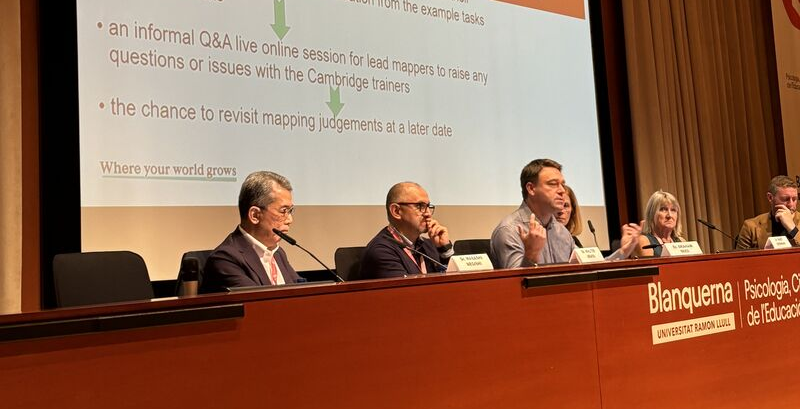01/11/2024
If you say a language exam or course is set at a certain level, how can you be sure? That was the focus of a recent conference in Spain attended by leading experts from the field of language learning and assessment. The conference at the Universitat Ramon Llull in Barcelona included contributions from researchers at Cambridge University Press & Assessment.

The ongoing importance of the Common European Framework of Reference (CEFR), the international ‘gold standard’ for measuring language ability was top of the agenda at a conference in October. The CEFR, which was developed by the Council of Europe in 2001, describes language ability from Pre-A1 for those who have just started on their language learning journey up to C2 for the most proficient learners.
The event was opened by Dr Sarah Breslin, Head of Language Policy at the Council of Europe and leading language assessment specialist Dr Neus Figueras on behalf of the organising committee. Experts shared experiences of aligning learning and assessment materials to the CEFR – looking at the support and guidance available such as 2022’s Aligning Language Education with the CEFR: A handbook.
Dr Nick Saville from Cambridge University Press & Assessment said:
“It was fantastic to listen to different experiences of aligning language learning and assessment tools to the CEFR. Cambridge have been instrumental in the creation and ongoing development of the CEFR, and the framework is more relevant now than ever”.
Future directions for aligning to standards
Saville also spoke about the best approaches for CEFR alignment and future directions in this area:
“When faced with the task of making sure a coursebook or exam is aligned to the CEFR, it’s essential that it’s carried out in line with best practice and makes use of effective guidelines,” commented Dr Saville. He continued: ‘You have to take into consideration the CEFR’s focus on communication skills, its many detailed descriptions of what a language learner can actually do in a language, and its well-known system of levels. It’s also important that we do not overlook the impact of new technologies such as GenAI and understand how these can help us in the future.”
The Handbook and this event were coordinated by representatives of ALTE, British Council, EALTA and UKALTA. Presentations from Cambridge experts included a look at how to carry out CEFR alignment using online workshops by Jane Lloyd, a look at defining C2 - the highest level of the CEFR by Annabelle Pinnington, a case study by Graham Seed on how Cambridge helped the Shanghai Municipal Educational Examinations Authority align their language tests to the CEFR and reflections on alignment issues from a publishing perspective by David Bradshaw.